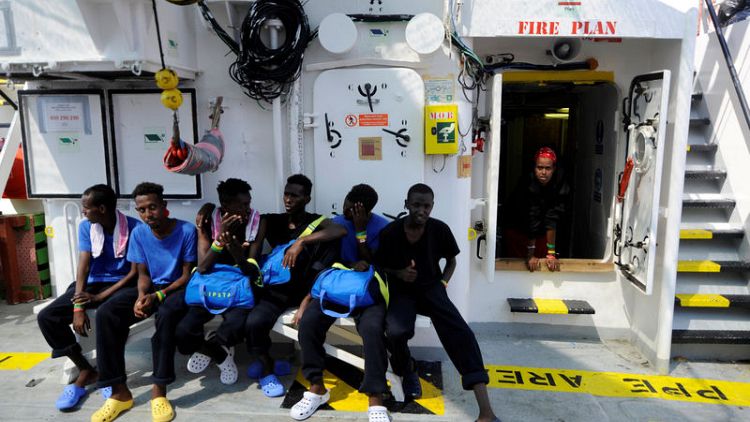VALLETTA/MADRID (Reuters) - Five European Union countries agreed on Tuesday to take in 141 migrants on board the Mediterranean rescue ship Aquarius, prompting Malta to say it would allow the ship, already barred from three coastal states, to dock.
The boat, run by the Franco-German charity SOS Méditerranée and Doctors without Borders (MSF), has already been at the centre of a continent-wide tug-of-war over how to cope with the arrival of seaborne migrants.
The decision ended a four-day standoff in which Spain, Tunisia and Malta also refused the ship entry.
The latest migrants had been rescued from boats off Libya, and Malta had initially argued that they should be taken to Libya, Tunisia or the Italian island of Lampedusa, all closer to the rescue points.
"Following discussions between France and Malta, a number of European Union member states, with the support of the European Commission, agreed on a responsibility-sharing exercise regarding the rescued migrants," the Maltese government said.
All 141 migrants would be distributed among France, Germany, Luxembourg, Portugal and Spain, it said, noting that a further 114 migrants rescued at sea had been brought to Malta on Monday. Sixty of these will also be distributed among other EU member states.
Spain will take 60 of the migrants, Spanish Prime Minister Pedro Sanchez tweeted. Portugal said it would take 30 from the Aquarius and other boats that had arrived in Malta.
Spain took in 629 mainly sub-Saharan Africans from the same rescue boat in June, and Sanchez said this had helped pave the way to the latest deal, which Malta called "a concrete example of European leadership and solidarity".
The latest row over where in Europe to land migrants fleeing war and poverty shows how little political progress has been made since EU leaders brokered a convoluted deal on migration in June that appeared designed to appease divergent views rather than provide concrete solutions to the crisis.
Frédéric Penard, director of operations at SOS Méditerranée, told a news conference: "Maybe European states have finally understood that this concerns our common border at the south of Europe, that this is a problem for the 28 member states, and that we can't avoid responsibility and should work together."
(Reporting by Andres Gonzalez in Madrid, Chris Scicluna in Malta, Axel Bugge in Lisbon and Ingrid Melander in Brussels; Writing by Isla Binnie; Editing by Kevin Liffey)
